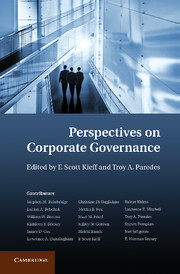Book contents
- Frontmatter
- Contents
- Contributors
- Acknowledgments and Dedication
- PERSPECTIVES ON CORPORATE GOVERNANCE
- Introduction
- PART ONE THE BOARD OF DIRECTORS AND THE CEO
- PART TWO THE WHY, WHEN, HOW, AND HOW MUCH OF EXECUTIVE PAY
- PART THREE CONSTRAINING MANAGERS AND DIRECTORS: INVESTORS, SECURITIES REGULATION, AND THE MEDIA
- 7 Shareholder Activism in the Obama Era
- 8 After Dura: Causation in Fraud-on-the-Market Actions
- 9 From Boardroom to Courtroom to Newsroom: The Media and the Corporate Governance Scandals
- PART FOUR DELAWARE VERSUS CONGRESS: ON THE FEDERALIZATION OF CORPORATE GOVERNANCE
- PART FIVE COMPARATIVE CORPORATE GOVERNANCE
- Epilogue: Three Secular Trends of Corporate Law
- Index
- References
7 - Shareholder Activism in the Obama Era
Published online by Cambridge University Press: 04 August 2010
- Frontmatter
- Contents
- Contributors
- Acknowledgments and Dedication
- PERSPECTIVES ON CORPORATE GOVERNANCE
- Introduction
- PART ONE THE BOARD OF DIRECTORS AND THE CEO
- PART TWO THE WHY, WHEN, HOW, AND HOW MUCH OF EXECUTIVE PAY
- PART THREE CONSTRAINING MANAGERS AND DIRECTORS: INVESTORS, SECURITIES REGULATION, AND THE MEDIA
- 7 Shareholder Activism in the Obama Era
- 8 After Dura: Causation in Fraud-on-the-Market Actions
- 9 From Boardroom to Courtroom to Newsroom: The Media and the Corporate Governance Scandals
- PART FOUR DELAWARE VERSUS CONGRESS: ON THE FEDERALIZATION OF CORPORATE GOVERNANCE
- PART FIVE COMPARATIVE CORPORATE GOVERNANCE
- Epilogue: Three Secular Trends of Corporate Law
- Index
- References
Summary
The first decade of the new millennium has seen repeated efforts by corporate governance activists to extend the shareholder franchise and otherwise empower shareholders to take an active governance role. The major stock exchanges, for example, implemented new listing standards expanding the number of corporate compensation plans that must be approved by shareholders. The Delaware General Corporation Law (DGCL) and the Model Business Corporation Act (MBCA) were amended to allow corporations to require a majority vote – rather than the traditional plurality – to elect directors.
The financial crisis of 2008, the election of Barack Obama as president of the United States, the expansion of Democratic majorities in both houses of Congress, and the installation of a Democratic majority at the Securities and Exchange Commission gave these efforts renewed impetus. Echoing such constituencies as unions and state and local government pension plans, Washington Democrats blamed the financial crisis in large part on corporate governance failures. Accordingly, much of their response took the form of new shareholder entitlements. The Department of Treasury's implementation rules for the Troubled Assets Relief Program (TARP), for example, contained a so-called say-on-pay provision requiring TARP-recipient institutions to hold an annual nonbinding shareholder vote on executive compensation. Senator Charles Schumer's (D-NY) proposed Shareholder Bill of Rights Act “would add a new Section 14A to the Securities Exchange Act of 1934 requiring each proxy statement covered by it to provide for a non-binding shareholder vote on executive compensation as disclosed in the proxy statement,” as well as requiring shareholder approval of golden parachutes in certain acquisition transactions.
- Type
- Chapter
- Information
- Perspectives on Corporate Governance , pp. 217 - 234Publisher: Cambridge University PressPrint publication year: 2010
References
- 2
- Cited by



